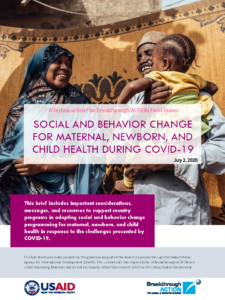Social and behavior change (SBC) remains a critical approach to support women, children, and families during the COVID-19 pandemic. However, the new environment created by COVID-19 poses a host of challenges, including abundant misinformation and rumors, changing patterns of communication with reduced personal contact, and evolving recommendations about safe practices and availability of services. In this environment, SBC practitioners need to adapt MNCH approaches and messages to ensure they resonate with the audience’s current emotional state and provide calls to action that are practical in the new reality of their daily lives. SBC practitioners must also find new ways of working that follow physical distancing guidelines while reaching audiences via trusted sources. This technical brief includes important considerations, messages, and resources to support country programs in adapting SBC programming for maternal, newborn, and child health in response to the challenges presented by COVID-19.
Social and Behavior Change for Maternal, Newborn, and Child Health During COVID-19
You are here: Home1 / Resource Library2 / Social and Behavior Change for Maternal, Newborn, and Child Health During...
This website was originally developed by Breakthrough ACTION (USAID Cooperative Agreement #AID-OAA-A-17-00017) under the leadership of Johns Hopkins Center for Communication Programs. This website is now maintained by Johns Hopkins Center for Communication Programs and its contents are the sole responsibility of CCP. The contents of this website do not necessarily reflect the views of USAID, the United States Government, or Johns Hopkins University.
© Johns Hopkins University. All rights reserved.


